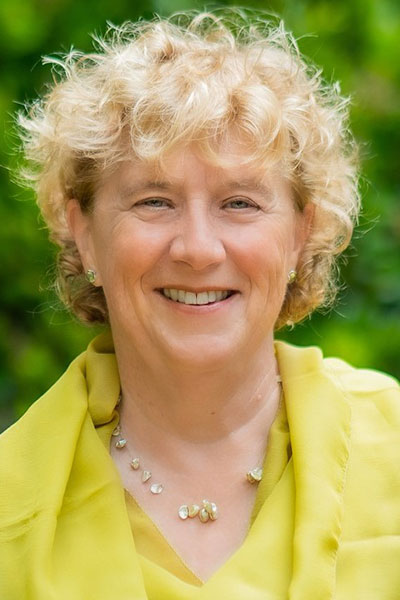
In recognition of her groundbreaking achievements in unlocking the molecular biology of breast cancer, Laura J. van ‘t Veer, PhD, will receive the William L. McGuire Memorial Lecture Award at the 2024 San Antonio Breast Cancer Symposium®.
Dr. van ‘t Veer is professor and Angela and Shu Kai Chan Endowed Chair in Cancer Research in the Department of Laboratory Medicine at the University of California, San Francisco (UCSF). She is also the director of applied genomics and leader of the Breast Oncology Program for the UCSF Helen Diller Family Comprehensive Cancer Center.
The William L. McGuire Memorial Lecture will take place on Wednesday, December 11, from 11:30 a.m. to 12 p.m. CT in Hall 1 of the Henry B. Gonzalez Convention Center. In her address to SABCS® attendees, Dr. van ‘t Veer will discuss her career and trailblazing work in advancing risk stratification, subtyping, and improving treatment for early breast cancer.
Her work began 30 years ago, she said, when she was appointed to start a department of molecular pathology at Netherlands Cancer Institute in Amsterdam. Her research on personalized medicine aimed to advance patient management based on the knowledge of the genetic makeup of the tumor and patient.
That focus led her to invent MammaPrint, a lab test that could help predict the likelihood that breast cancer will come back or spread to other parts of the body by looking at the activity level of 70 different genes in breast cancer tissue.
“At that time, particularly in the United States, more than 80 percent of women diagnosed with breast cancer would get chemotherapy,” Dr. van ‘t Veer said. “When I started to work on MammaPrint, or the 70-gene signature as it was called then, the hope was that it could help us to identify women with breast cancer who would not need any chemotherapy because their risk of recurrence was so very low.”
In 2016, the results of the European MINDACT trial demonstrated the utility of MammaPrint by showing that approximately 46 percent of clinically high-risk breast cancer patients who typically would undergo chemotherapy could safely forgo treatment based on a low-risk MammaPrint result.
By that time, Dr. van ‘t Veer had relocated to the United States to continue her research at UCSF. She had begun her work in the I-SPY trials looking at new targeted drugs in combination with standard chemotherapy in newly diagnosed patients who were determined, based on their MammaPrint results, to be at high risk for recurrence. Her efforts led to the development of a valuable biomarker bank of clinically annotated tissue and blood samples from over 3,000 high-risk early breast cancer patients.
“Based on this work, we now have created response-predictive subtypes, so that when a woman is at high risk for recurrence, we can also identify to which treatment she is likely to respond,” Dr. van ‘t Veer said. “We are now in the next iteration of the I-SPY trials where we are actually using the response-predictive subtypes to guide patients to the right treatments, and if you guide patients to the right treatment, you can prevent the possibility of severe side effects.”
The ability to recognize tumor subtypes that provide information for the likelihood of responding to a specific targeted therapy is a huge step forward in personalizing breast cancer care. The next step, she said, will be establishing how testing and screening gets implemented into the standard of care.
“The infrastructures in hospitals are increasingly starting to include standard testing for biomarkers and I think will soon come to a level that it will become standard everywhere,” Dr. van ‘t Veer said. “When I started working in this field 30 years ago, precision medicine was a term that was just starting to come up, but precision medicine is a reality now, and the individualization of care based on the biology of the tumor of the patient is now becoming possible.”
The William L. McGuire Memorial Lecture Award was established in 1992 to commemorate Dr. McGuire’s significant contributions to breast oncology. Dr. McGuire, along with Charles A. Coltman, MD, founded the SABCS® in 1978.
2024 SABCS® full program now available
Don’t miss the latest clinical trial findings and multidisciplinary discussions on every aspect of breast cancer and premalignant breast disease. The online program for the 47th annual San Antonio Breast Cancer Symposium® has been updated with session titles, presentation topics, and other details, including a list of the nearly 2,000 posters that will be presented during the week. Start planning your itinerary today!

